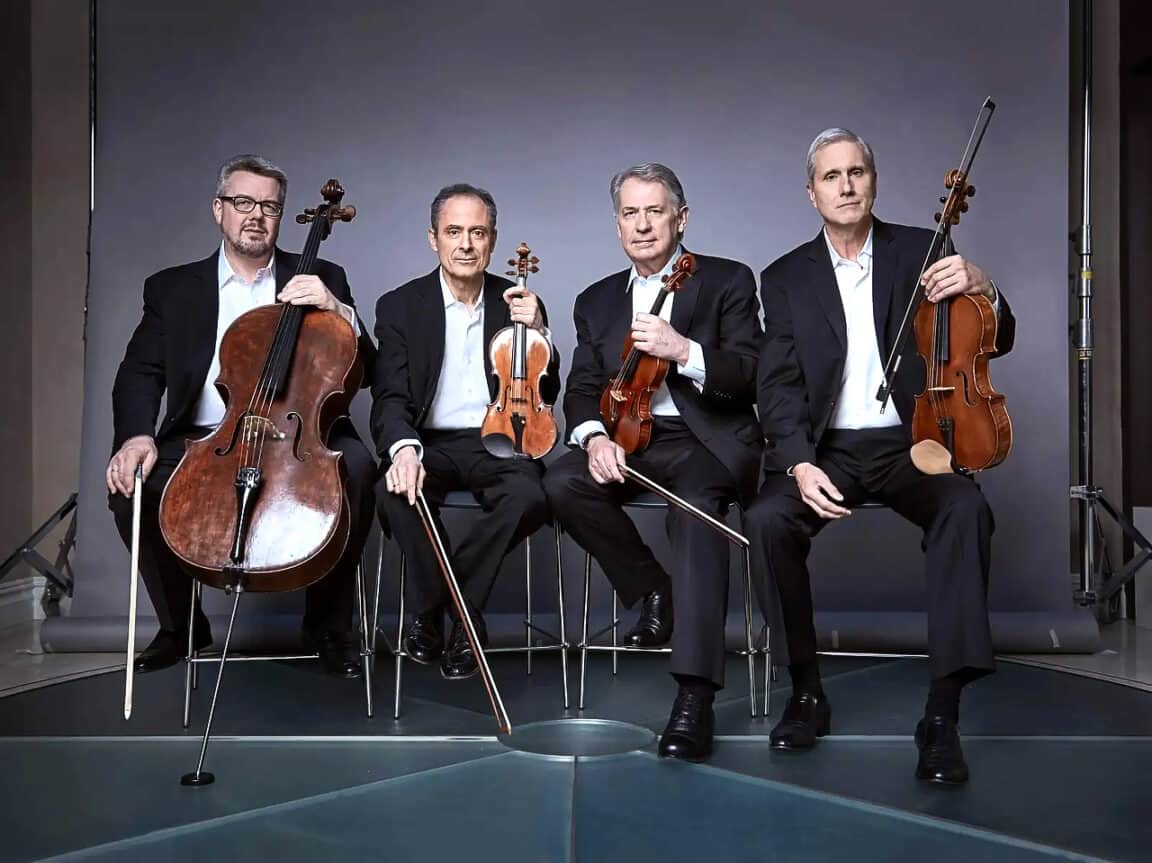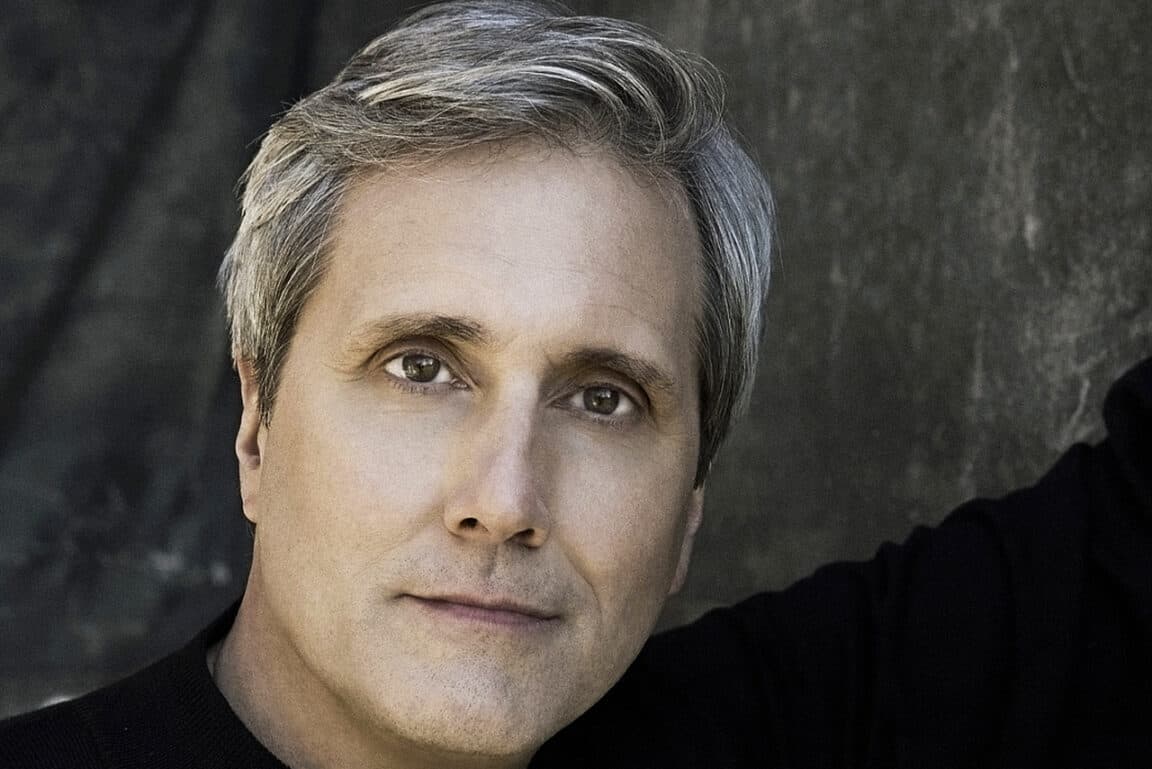The Emerson String Quartet will play its final concerts for Portland Thursday, July 6 and Saturday, July 8 in Kaul Auditorium, and in Eugene on Friday, July 7 at Beall Concert Hall. After this season, one of America’s most celebrated string quartets will officially retire.
ArtsWatch was fortunate to catch Lawrence Dutton, the Emerson’s violist, for an interview while the quartet was playing at the Great Lakes Chamber Music Festival in Michigan. Dutton approached the subject of retirement with good humor and the relaxed attitude of someone who doesn’t have to worry about his image.
(Read our previous interview with Dutton here).
SWAN SONG
The Emerson’s members have had plenty of questions about their “swan song,” so Dutton was ready with the explanation: “Prior to Covid we had talked about the idea of stopping. It’s a heck of a conversation to have.” But they decided that the time was approaching and sooner or later they would have to make an announcement.
Then came Covid. “I enjoyed that time of not having to get on an airplane and travel around. Covid actually reinforced the idea that, yes, I would like to finish! That period of two years not performing made all of us realize that this has been an incredible run, and exhausting in many, many ways.”
Dutton felt like he didn’t want to wait too long. “There’s many musicians that don’t ever want to stop. I’ve had mentors and teachers like that, and they really should have stopped.” He wants to quit while he and the Emerson are still playing well, and people will say, “Why are you stopping? You sound so good!!”
When cellist David Finckel left the Quartet in 2013, the Emerson could have retired after a long and richly productive 34 years, but the others weren’t ready. At that time Dutton was 59, and violinists Eugene Drucker and Philip Setzer were 61 and 62 respectively. Then along came Paul Watkins and “we just won the lottery,” Dutton recalls. “Paul is one of the greatest musicians I’ve ever heard, and I think we all agree that he’s one of the finest cellists on the planet. We got so lucky we didn’t even have to have an audition — we just sat down and that was it. It was like the stars were aligned. By getting Paul we breathed new life into the Emerson for 10 more years and we’ve done a lot of cool stuff in the last 10 years.”
(Read our previous interviews with Drucker, Setzer, and Watkins).
AGING OUT?
Dutton believes that there’s a general age limit for people playing various kinds of instruments. For example, he puts the limit for singers at around 60, particularly for sopranos, who have roles that demand perfect high notes. “But if you’re a pianist or conductor, it seems like you could just go on forever — waving your arms around [as a conductor], and if you’re a pianist, maybe you don’t play all the notes, but if you have a beautiful sound in the right hand, so who cares?”
But string playing is a different matter. “By the time you get to 70, this is not getting easy anymore. Your fingers,” he groans, “the stiffness, trying to be smooth drawing the bow, keeping the vibrato, it takes a lot of work! I can still play well, but I’m not going to get better.” He laughs, and then says almost reluctantly, “I can still project what I want musically. I can make it slightly different from performance to performance, but I just can’t make any more interpretations of a Beethoven Quartet.”
“Now it’s time for the younger people to take it over — the Calidores, the Eschers, and all the other great young quartets. I’m happy to have been part of that chain.”
TIME FOR YOUNG QUARTETS
Dutton speaks enthusiastically about the coming contingent of young string quartets and the Emerson’s role in creating programs and institutes to support them. Watkins is artistic director of the Great Lakes Chamber Music Festival, which just wound up its 2023 festival. Setzer directs the Shouse Institute, which supports and coaches young chamber music groups in conjunction with the Great Lakes Festival. Dutton and Setzer are tenured professors, and all four of the current Emersons (as well as Finckel) are on the faculty of the State University of New York at Stony Brook, where the Emerson is Quartet in Residence. Dutton also described a relatively new two-year program called the Emerson String Quartet Institute at Stony Brook, where, he says, ”we’re getting some incredible people forming quartets and coming into the program.” Two of the Stony Brook DMA candidates attended the recent Great Lakes Festival.
According to Dutton, the most important advice to young string quartet players involves commitment: “To play in a string quartet, all four people have to be totally committed to that. You’re not necessarily going to make a lot of money, but you have to be dedicated to the art of playing string quartets and dedicated to the interpretation and the study of these great pieces. You have to want that very badly, all four of you have to want it, and all four of you need to be on the same page.” That statement says a great deal about the success of the Emerson Quartet.
A second bit of advice Dutton would like to pass on to the younger generation is another key to the Emerson’s longevity: “You have to have respect for each other, to be able to give and take criticism in a friendly and respectful way. And, as we say in the Emerson, one of the most important things is to have a good sense of humor.”
MISS THE EMERSON?
Evidently the Emerson’s members have been asked repeatedly about how they feel about such a big change in their lives. Dutton replies, “I don’t know. I’m still too busy. It’s the kind of thing where you want to be able to step back and look at it and try to take it all in, and I can’t do that.”
In one sense he won’t miss it, and that is the fact that it’s really demanding! “It’s so hard to try to keep the level up to the highest standard. And the string quartet is the hardest repertoire in chamber music. There’s nothing harder. Add another instrument and it’s much easier. Any quartet player will tell you that.”
Will he miss playing such gorgeous and perfect string quartets? “Probably, I guess, but that’s OK. There are plenty of other things to think about. I’m looking forward to having a little more time. I used to be the youngest in the Quartet but not anymore. Paul is the youngest— he’s 53 years old but I’ll be 70 next year so you know, I feel that’s a perfect time to stop!” Of course he won’t stop playing at all, but his life will be very full with other activities.

THREE FORMS OF FINALITY
1. The Final Recording: Soprano Barbara Hannigan will join the Emerson for a very interesting final recording, soon to be released. It will include Schoenberg’s String Quartet No. 2, Op. 10, Berg’s String Quartet Op. 3, and two pieces for string quartet and soprano: Hindemith, Op. 13 entitled “Melancholy, for low female voice and string quartet” and Chausson, Op. 37, “Chanson Perpétuelle,” the latter including piano.
2. The Final Concert(s) will take place in New York City at Lincoln Center (of course), October 21 and 22, 2023. Dutton explains: “We made our final concert for October 22 and that sold out in about five minutes, so we’re repeating the concert the night before, and I think that’s almost sold out too.” Whether there will be yet another on Oct. 20 is doubtful. The Emerson will play the Beethoven Op. 130 with the Grosse Fuge Op. 133 and the Schubert Quintet for two violins, viola, and two cellos, D. 956, Op. 163, with none other than David Finckel on the second cello.
3. The Final Story will take the form of a feature-length documentary called Late Style:The Final Notes of the Emerson Quartet. The film will include excerpts from some of the Emerson’s memorable performances as well as behind-the-scene conversations. Scheduled for release in 2024, it is being written and directed by Tristan Cook and produced by Birgit Gernbōck.
THE EMERSON’S PLACE IN THE CHAIN
Dutton believes that he and his colleagues have been fortunate to be placed in the middle of a chain stretched between the era of famous 20th century composers and the new young composers and students of today. As he says, “We have had all these incredible experiences, like knowing people who worked with Ravel. We’ve known people who have worked with Bartók. Obviously those people are gone, but to pass on these stories and to pass on what we know is so important! The Emerson, you know — we sit right there in that chain, that tradition. I mean that’s a great feeling!”
It’s also a gift.



